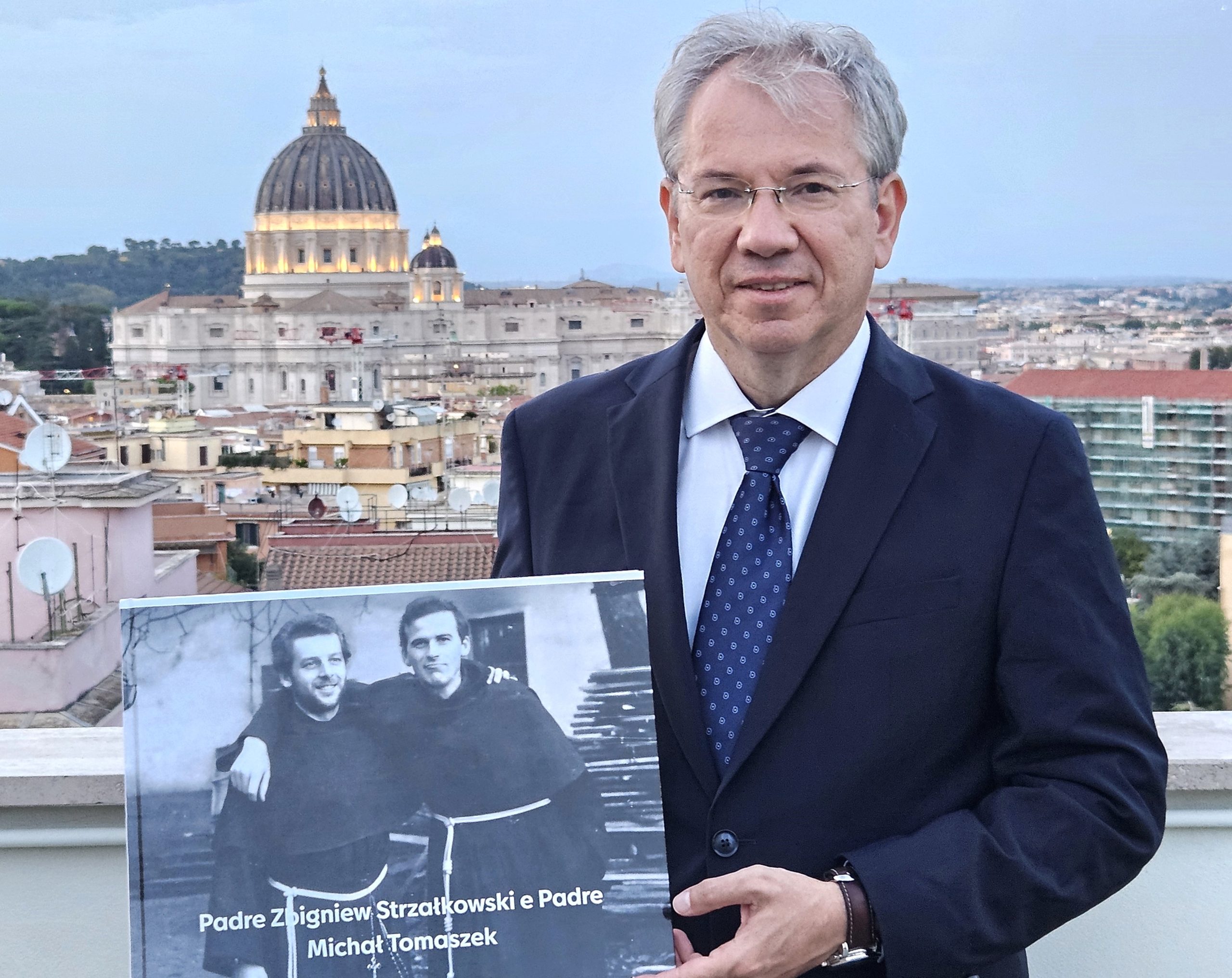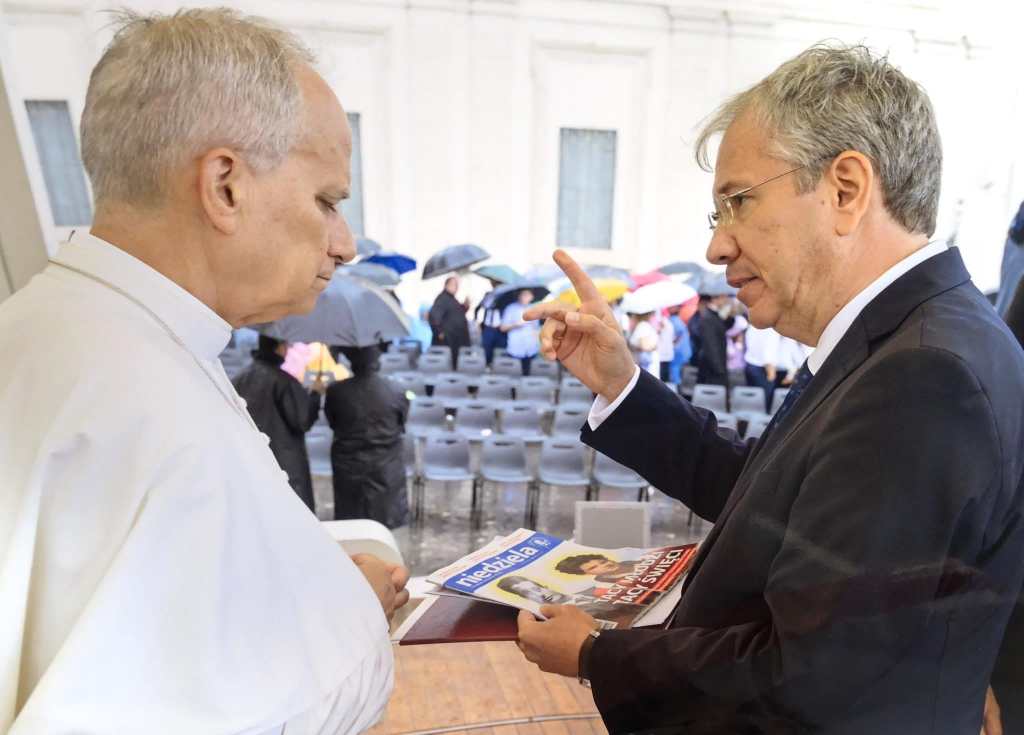During the general audience on September 10, Leo XIV received from Krzysztof Tadej, a Polish journalist and filmmaker, an album and a film about the Polish Franciscans murdered in Peru, Zbigniew Strzałkowski and Michał Tomaszek. The friars were kidnapped on August 9, 1991, and later shot by Maoist terrorists of Sendero Luminoso in Pariacoto. Recognized by the Church as martyrs, they were beatified in 2015 in Chimbote, precisely when Father Robert Prevost, then Bishop of Chiclayo, was in Peru.
Tadej was immediately fascinated by the figures of these two martyrs, who carried out their mission 11,000 kilometers from their native Poland. They departed for Latin America in 1988. The Franciscan order decided to open a new mission in Pariacoto, in the Diocese of Chimbote, in a mountainous and isolated area of Peru, at an altitude of 1,200 meters. The three Poles soon arrived in the small Andean village and found a difficult reality: the population lived in extreme poverty, there was no electricity or running water, and the church was in a state of abandonment. The parish covered a territory as large as a European diocese, with 73 villages, some as high as 4,000 meters above sea level. Unfortunately, the Maoist organization Sendero Luminoso was very active in the area. Their evangelization and assistance work disturbed the communists, who aimed to carry out a revolution, as they needed discontented masses angry with the government. In the 1980s and 1990s, Sendero Luminoso terrorists caused the death or disappearance of around 70,000 people, effectively waging a civil war.
The work of evangelization and assistance to the population bothered the communists, who sought revolution, as they needed discontented and angry masses. On the evening of August 9, 1991, Sendero Luminoso members arrived at the Pariacoto mission in search of the priests. At that moment, only the two friars who are now beatified were present, as the superior had traveled to Poland. Friar Zbigniew and Friar Michał confronted the terrorists and were immediately loaded into a truck and taken out of the village. Also in the vehicle was a brave Peruvian nun, Sister Berta, who became a witness to the accusations the torturers leveled at the friars during a grotesque revolutionary trial. It may seem absurd, but they were accused of doing good, and therefore of slowing the people’s anger and the revolution, of being sent by John Paul II and the CIA, and of proclaiming God. Shortly after, near the small village cemetery, they were executed, along with the mayor of Pariacoto, with a shot to the back of the head. The terrorists left a message on Father Strzałkowski’s bloodied body: “Thus die the servants of imperialism.”

When the dramatic news of the Franciscans’ murder arrived from Peru, John Paul II was in Krakow for World Youth Day. Commenting on this tragic event, the Pope said: “They are the new holy martyrs of Peru.” Twenty-three and a half years after their deaths, on February 3, 2015, the Congregation for the Causes of Saints recognized the martyrdom of the Servants of God Zbigniew and Michał, and Pope Francis authorized the promulgation of the relevant decree. Their beatification took place on December 5, 2015, in the Peruvian city of Chimbote, the diocese where the martyrs carried out their mission.
Before the beatification, Tadej decided to prepare a documentary film for Polish television TVP about the life of these two martyrs, titled “Life Must Not Be Wasted”. The film was shot over six months, both in Peru and in Poland. The director visited places linked to these Polish Franciscans, collecting significant photographic and video documentation. The film, presented on the eve of the beatification, achieved great success internationally, as it was prepared in seven languages. Tadej’s film was recognized as Best Documentary at the Mirabile Dictu Festival in 2016.
It was precisely this film that the director presented to Leo XIV during the audience on September 10. For the occasion, Tadej prepared an album with photographs taken in Peru of places and people related to the story of the Franciscan martyrs, also known to Father Prevost. During the audience, Leo XIV signed the photographs with the relics of Fathers Michał and Zbigniew: one for the martyrs’ sanctuary being organized in Poland, and the other for the director himself.

It should be noted that Krzysztof Tadej is the author of a unique interview with the nanny of Saint Carlo Acutis, Beata Sperczyńska, published exclusively by the Polish Catholic weekly Niedziela and in Italy by Famiglia Cristiana. Tadej delivered copies of these two weeklies to the Pope, who showed interest in the story of this young Polish woman who cared for the young Carlo for four years, now a saint.
